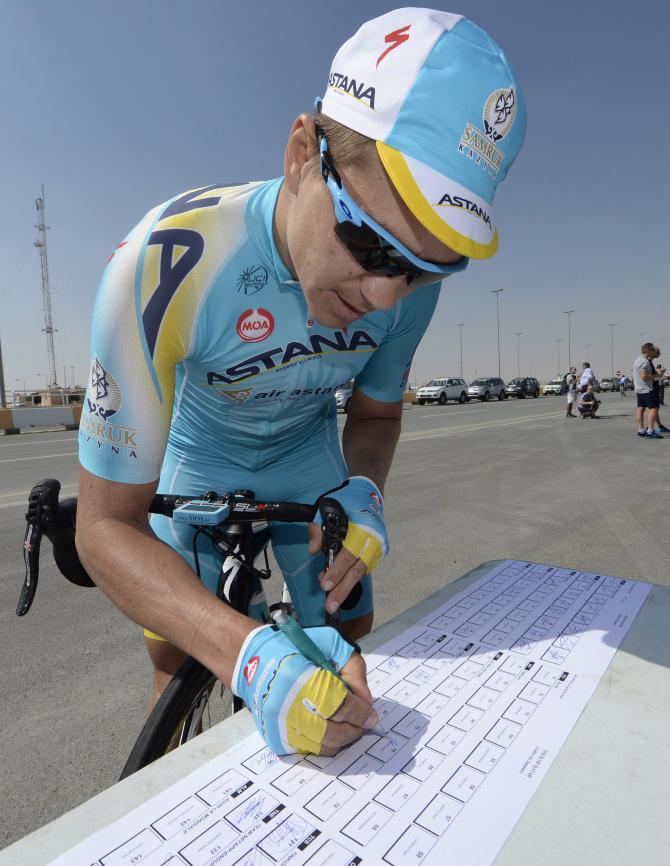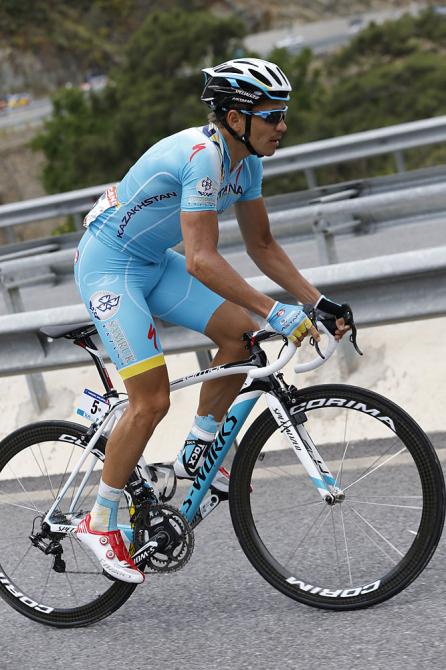Astana respected MPCC rules, says Legeay
Kazakh squad misses Tour of Beijing after Iglinskiy positives


Movement for Credible Cycling president Roger Legeay has rejected the idea that Astana did not act within the spirit of MPCC rules in its handling of Maxim and Valentin Iglinskiy’s recent positive tests for EPO, which led to the team’s withdrawal from this week’s Tour of Beijing.
MPCC regulations state that member teams must suspend themselves for eight days – starting from the next WorldTour race – if two of their riders return positive tests within a twelve-month period, and when news of Maxim Iglinskiy’s positive test broke last Wednesday, it initially seemed as though Astana would miss its home race, the Tour of Almaty, as well as the Tour of Lombardy.
Iglinskiy’s delay in deciding whether or not to seek the analysis of his B sample meant that Astana was able to compete in its showcase race, however, with Tour de France winner Vincenzo Nibali among those on hand in Kazakhstan. On Monday, Astana then announced that Maxim Iglinskiy would not seek a counter-analysis, triggering a voluntary self-suspension that rules the team out of the forthcoming Tour of Beijing, Giro dell’Emilia and GP Beghelli.
The five-day gap between the news of Maxim Iglinskiy’s positive test and his decision not to have his B sample analysed contrasts with the rather more immediate timeframe that saw his brother Valentin confess to doping within two hours of the UCI announcing his positive test last month, but Legeay insists that the MPCC has no reason to reproach Astana’s actions.
“Astana respected the rules, they had to wait for a decision to be made about the B sample,” Legeay told Cyclingnews. “It’s not right to say that they should have missed Lombardy or Almaty. The news of the positive test emerged on Wednesday, then Iglinskiy confessed on Monday and the team suspended itself, which is a quick turnaround.”
It seems apparent, however, that Astana would have been very reluctant indeed to forgo the Tour of Almaty, considering that the race saw Nibali in action on the roads of the team’s sponsors. Astana’s Alexey Lutsenko duly claimed the event, which was won by Maxim Iglinskiy last year.
Astana is the third team to suspend itself as per MPCC regulations following Ag2r-La Mondiale and Rusvelo last year, but there is a sense that withdrawing from the Tour of Beijing is perhaps not quite the same penance as missing local race Critérium du Dauphiné was for Ag2r, for instance.
Get The Leadout Newsletter
The latest race content, interviews, features, reviews and expert buying guides, direct to your inbox!
“The Tour of Beijing is still a big race, it’s a WorldTour race and it’s important for UCI points,” Legeay said. “Maybe the Tour of Beijing is more or less important for Astana than the Dauphiné was for Ag2r, but it’s not right to say that they haven’t respected the rules of the MPCC. They suspended themselves for eight days without any debate.
“And the fact is that if they weren’t a member of the MPCC, nothing would have happened. Not only would they have done Almaty and Lombardy and then they would also be racing the Tour of Beijing now.”
Anomaly
Indeed, the fact that only 11 of the 18 WorldTour teams are currently members of the MPCC has created something of an anomaly, as there are two different sets of anti-doping rules simultaneously in place in the professional peloton – those of the UCI and the more stringent but voluntary measures imposed by the MPCC.
Already in 2014, Sky’s Chris Froome won the Tour de Romandie while holding a therapeutic use exemption for a corticosteroid that would not have been permitted were he on an MPCC team, while Lampre-Merida withdrew Chris Horner from its Vuelta a España roster after he returned low levels of cortisol in additional pre-race testing carried out by the MPCC.
“I have a conviction: the philosophy of the MPCC is indispensable to cycling, it’s a complement to the UCI rules and it helps to bring credibility to the sport,” Legeay said. “In this instance, Astana has had two positive in quick succession. The UCI could take no action against the team but as a voluntary organisation, the MPCC could do something and has done something.”
In a statement on Monday, the MPCC said that the auto-suspension was designed in part “to implement any corrective action they deem appropriate.” “Two riders testing positive in a year isn’t normal, that’s why the auto-suspension is there. The team has to look at what hasn’t been working and put in place firmer internal rules,” Legeay said. “Simply taking time away from racing is also a symbol to the riders on the team – it makes them understand that they have no room to cheat because there will be consequences for the rider and the team.”

Barry Ryan was Head of Features at Cyclingnews. He has covered professional cycling since 2010, reporting from the Tour de France, Giro d’Italia and events from Argentina to Japan. His writing has appeared in The Independent, Procycling and Cycling Plus. He is the author of The Ascent: Sean Kelly, Stephen Roche and the Rise of Irish Cycling’s Golden Generation, published by Gill Books.